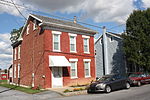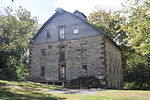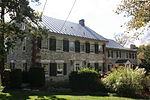Womelsdorf, Pennsylvania
1762 establishments in PennsylvaniaBoroughs in Berks County, PennsylvaniaPopulated places established in 1762

Womelsdorf is a borough in Berks County, Pennsylvania, United States. The population was 2,810 at the 2010 census. The main thoroughfares through Womelsdorf are High Street, which runs east–west, and Pennsylvania Route 419, which runs north–south. U.S. Route 422 runs along the northern edge of town.
Excerpt from the Wikipedia article Womelsdorf, Pennsylvania (License: CC BY-SA 3.0, Authors, Images).Womelsdorf, Pennsylvania
West Franklin Street,
Geographical coordinates (GPS) Address Nearby Places Show on map
Geographical coordinates (GPS)
| Latitude | Longitude |
|---|---|
| N 40.365277777778 ° | E -76.187777777778 ° |
Address
West Franklin Street 258
19567
Pennsylvania, United States
Open on Google Maps










